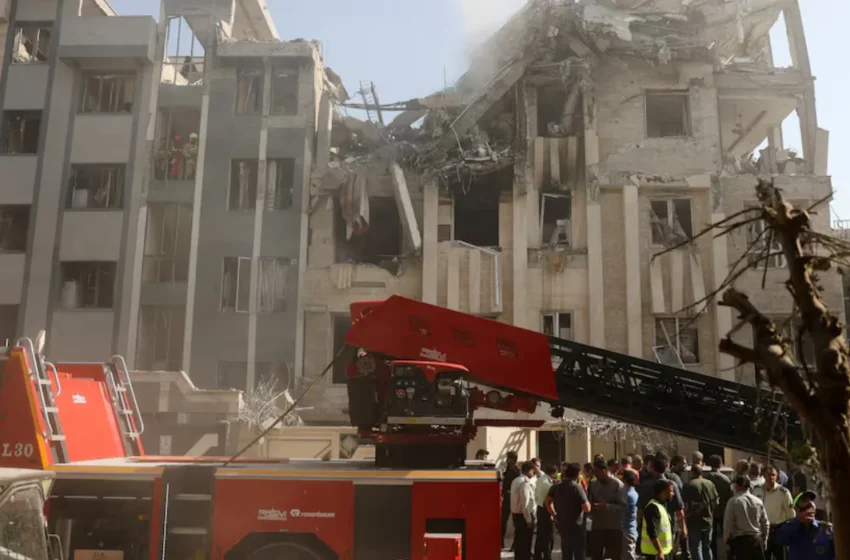
Washington ( Europe Brief News): Trump urges Iran to curb its nuclear programme after Israeli airstrikes kill key commanders; Tehran vows retaliation as regional tensions escalate.
Trump encouraged Iranian authorities to “make a deal before there is nothing left” in a post on his Truth Social platform on Friday, warning that the “next already planned attacks” on Iran will be “even more brutal.”
“Iran must make a deal, before there is nothing left… JUST DO IT, BEFORE IT IS TOO LATE,”
He said.
The US president claimed to have given Tehran 60 days to reach an agreement two months ago, but in a subsequent tweet on his social media site, he suggested that Iran might have another chance.
“I told them what to do, but they just couldn’t get there. Now they have, perhaps, a second chance!”
While Tehran declared Washington would be “responsible for consequences,” Secretary of State Marco Rubio had earlier stated that the United States had no involvement in the Israeli attacks and urged Iran not to target American interests or personnel in the region in retaliation.
The Israeli military said early Friday that it was attempting to intercept over 100 drones launched into Israeli territory in retribution after Iran threatened to take serious action against Israel.
According to Iranian official media, the strikes claimed the lives of Mohammad Bagheri, the chief of staff of Iran’s Armed Forces, and Hossein Salami, the commander-in-chief of the Islamic Revolutionary Guard Corps. Fereydoun Abbasi and nuclear scientist Mohammad Mehdi Tehranchi were also slain.
According to Israeli army spokesman Brigadier General Effie Defrin, almost 200 Israeli jets participated in overnight airstrikes on Iran, striking over 100 targets in the nation.
Targeting the primary uranium enrichment plant in Natanz, Prime Minister Benjamin Netanyahu said that Israel had struck at the “heart of Iran’s nuclear enrichment program.”
The attacks would “continue as many days as it takes”, he said.
Explosions, including those at the main uranium enrichment facility at Natanz, were reported by Iranian media. Although there were no confirmed casualties, Iran’s Atomic Energy Organization stated that Natanz had been damaged.
A new Israeli attack in the northwest Iranian city of Tabriz was reported by Iran’s Tasnim news agency on Friday afternoon.
According to Iran’s Fars news agency, the attacks claimed the lives of at least 78 individuals and injured over 320 more.
Following the attack, Iran’s Supreme Leader Ayatollah Ali Khamenei cautioned Israel that it “must expect severe punishment.” Furthermore, Tehran has a “legal and legitimate” right to reply, according to the nation’s Ministry of Foreign Affairs.
Iranian President Masoud Pezeshkian said Israel would “regret” its attacks.
“The Iranian nation and the country’s officials will not remain silent in the face of this crime, and the legitimate and powerful response of the Islamic Republic of Iran will make the enemy regret its foolish act,”
Pezeshkian said in a video statement broadcast on state television.
Israel’s military claimed to be intercepting Iranian drones on Friday. Israel also caught drones over Saudi Arabia, according to Channel 12 and the nation’s main television.
Israeli media said at around 8:00 GMT that a previous order that required residents to stay close to protected areas had been revoked.
Hundreds of demonstrators gathered at the Jamkaran Mosque in the Iranian city of Qom to call for Israel to face “severe punishment” for the strikes.
According to Tehran University research fellow Mohammad Eslami, Iranian leaders are getting ready to launch an attack on Israel that would target its nuclear and military installations.
“The Iranian military were thinking about this scenario for many years and also in recent days, we have heard lots of statements by the Defence Ministry of Iran that they are ready for any strike by the Israelis,”
He told Al Jazeera from Tehran.
“Most Iranian political parties support defending the country because all Iranians [know] the history of Iraq attacking Iran. This is not about political points of view,”
He added.
Iran’s uranium enrichment has been a topic of negotiation between the two parties; Trump has declared that “zero” enrichment should be permitted in Iran. Additionally, he has stated time and time again that Iran will not be permitted to get nuclear weapons.
Tehran has often stated that it is only developing nuclear weapons for civilian use.
Iran stated in a statement that Israel’s “cowardly” attack demonstrated why it was necessary for Iran to demand nuclear technology, missile power, and enrichment.
For the first time in over two decades, the Board of Governors of the International Atomic Energy Agency judged Iran to have violated its non-proliferation commitments on Thursday.
How might Iran’s response influence the possibility of a broader Middle East conflict?
Tehran still has sway over Shi’ite forces in Iraq, the Houthis in Yemen, and allies like Hezbollah in Lebanon, despite the fact that Israeli attacks and internal issues have undermined Iran’s direct military capabilities.
Without engaging in direct combat, Iran may escalate conflict on several fronts by using these proxy groups to attack Israeli or ally targets.
Iran has historically preferred measured and proportionate reactions to prevent full-scale confrontation, seeking to reestablish deterrence rather than incite mass hostilities.
But when senior commanders are killed and nuclear facilities are damaged, the stakes are significantly raised, raising the possibility of a more forceful response that might lead to additional Israeli military action.


